Spark Joy by Decluttering your Cleaning Cabinet.
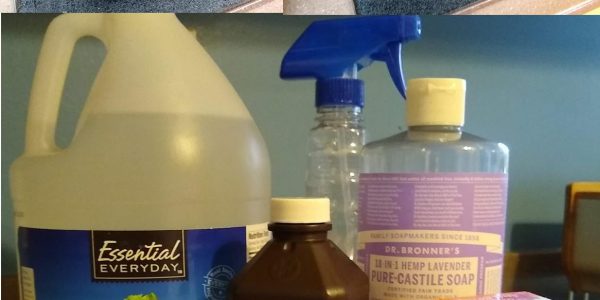
I’ve been reading a lot about spring cleaning lately. Maybe in part because Marie Kondo has become so popular in the mainstream? It’s great that she has really encouraged people to downsize and get rid of all the stuff they have purchased that no longer brings them joy. However, it recently came to my attention that not once in her “Tidying Up” show has she even mention anything about the environmental impacts of owning so many things. Wouldn’t it be great if in the process of helping people clean their lives of unnecessary and unwanted stuff she talked (even a little) about how maybe buying less stuff in the first place could make an even greater impact on simplifying their lives? Maybe if they could slim their purchases they wouldn’t be in the predicament of being surrounded by overwhelming mounds of stuff?
But in the end, maybe the KonMari method of decluttering will have a happy side effect of helping decrease excessive consumerism. Who knows?
Speaking of decluttering and spring cleaning, I’m in it. I’m going to be honest here and air out one of my personal shortcomings: I am a terrible housekeeper. While I don’t think I’m excessively messy, I’m just not great at cleaning. And, frankly, I don’t really enjoy doing it! Anyone else in this boat with me? But through the process of ridding yourself of things that no longer “spark joy”, I want to bring the cleaning closet to attention. We really don’t need all those products that the advertisements say we need — plus most of those cleaners are considered household hazardous waste. They are toxic to our bodies, our kids, our pets and our environment.
But we really don’t need all that stuff! Here is a list of 8 simple items that you need to keep your house clean. Two nice things about this list: most items are already found in your house and they are all non-toxic.
- Vinegar – Removes grease and soap scum. Deodorizer.
- Castile Soap – General cleaning agent.
- Baking Soda – Mildly abrasive. Deodorizer.
- Lemon or essential oils – Good for making your homemade cleaners smell good! But not necessary.
- Salt – benign abrasive substance.
- Hydrogen Peroxide – Disinfectant.
- Rubbing Alcohol – Disinfectant, but very flammable. Use only in well-ventilated areas.
- Elbow Grease
Here are a couple of easy DIY recipes for household cleaners:
- All-Purpose Household Cleaner.
Combine in a spray bottle: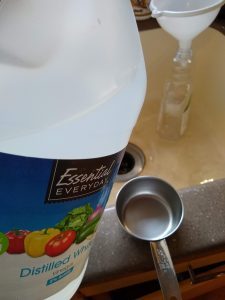
-1/4 cup distilled white vinegar
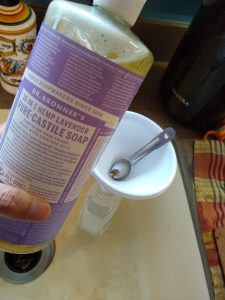
-1/2 teaspoon liquid soap
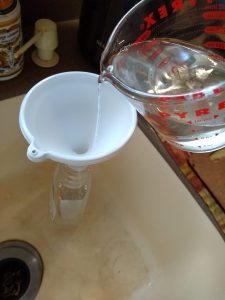
-3/4 cup warm water
Shake to blend.
- Abrasive cleaner #1 for surfaces
Combine baking soda with enough water to make a paste. Apply with a rag. - Abrasive cleaner #2 for surfaces
Combine full strength distilled white vinegar with some salt. Apply with a rag.
To inspire you to do some spring cleaning of your own, here is my own endeavor of cleaning my stove. It’s a tough stove to clean, and as I already mentioned. It has glass that always shows smudges and huge troughs beneath each burner that are magnets for all the food bits I drop. I used both abrasive cleaner #1 on the left two burners and abrasive cleaner #2 on the right burners.
Here is my post-cleaning session stove! Isn’t it beautiful?
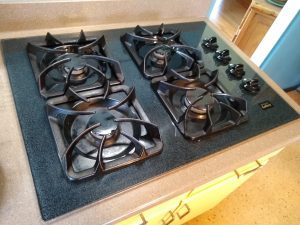
What I learned:
- Abrasive Cleaner #1:
- The baking soda worked well as a scrubbing agent.
- The baking soda left a slight film on the glass and burner surfaces but was easily wiped up with a rag after the main cleaning event.
- Abrasive Cleaner #2:
- The salt was a little tough to get all off of the stove, but was an excellent abrasive agent.
- The vinegar mixture was better at removing more grease.
- The vinegar mixture was also a better glass cleaner.
- Elbow grease was an important ingredient with both mixtures.
- Overall I would choose the vinegar mixture for my stovetop in the future.
- I think the best practice is to clean on a regular basis rather than wait for Spring Cleaning!
Check out this link for more recipes for DIY cleaners such as windshield wiper fluid and toilet bowl cleaners. Also, here is our blog about DIY Laundry Soap!
What are your DIY cleaning tips? What works best for you?